#nkrumaism
Explore tagged Tumblr posts
Text
Eastwood Danso outono/inverno 2024
by Adriano B. Eastwood Danso Eastwood Danso extrai sua estética única do “Nkrumaism” e de eventos globais. A narrativa pessoal do designer está intrinsecamente tecida em cada peça, com influências que vão de meados da década de 1980 ao início dos anos 2000, provenientes de fotografias de arquivo da família Danso. A segunda coleção da marca, intitulada “Wicked Love”, contempla o conceito de…

View On WordPress
0 notes
Text
Week 4 Blog
This week, I read 126-156 of the book “Nkrumah and the ghana revolution by C.L.R James.
The most important sentence of the week can be found on page 146: “ Now the first point I would like to make is that policies which have been associated with Ghana and your great political leader are already established as policies for the emancipation of africa.” In this sentence, the author is beginning the next step forward after their win with ghana. By talking about the emancipation of Africa, they are bringing to light the situation other parts of Africa are in, now that they have taken over the government and kept it within the people of ghana. This acknowledges the fact that other parts of Africa too have the same issues that they had previously, with Britain and even other European countries having all the control over what goes on in countries in africa. They believe with what Nkrumah is doing for Ghana, that soon the other countries will be able to take from that and begin the start of their states the right way this time.
All in all, I think this part of the book is my favorite so far. Just to see how the people now really believe in everything Nkrumah is doing for Ghana and Africa, and also how they are beginning to spread the movement to other parts of Africa to further emancipate the land from imperialism and other negative factors really moves me. On page 148 of the book they began to say “Long live Nkrumaism”. To have your name now turned into a saying as if it was a philosophy really begins to show how essential and how big of a role Nkrumah played in the revolution of ghana.
Blog word count : 302
1 note
·
View note
Text

the struggle for independence began through the protest of a land bill, with the second world war bringing up forms of economic independence. independence was gained officially in 1951, in part due to the work of The Big Six, although there are many unsung heroes, especially as such efforts are communal. Nkrumah was instated as leader after some internal battle, and championed panafricanism, hoping for ghana to move forward as a nation with and for their own people. some of his works and beliefs remind me of those of Aime Cesaire on the #discourseoncolonialism. he desired national pride, but more than that was seeking a "black pride", installing the black star in the middle of the flag and the black star square pictured above. he studied about many of the people we read and viewed through the class. fresh from the post-colonial period, he also put emphasis on some of the ideas of the nation-state, similar to Fanon in #wretchedoftheearth. nkrumaism believed that European class distinctions in marxist-lenin study were not fully applicable and drew from pre-colonial African practices and more to push forward the ideology. the impact is described to be more cultural than on the country's politics.
0 notes
Photo
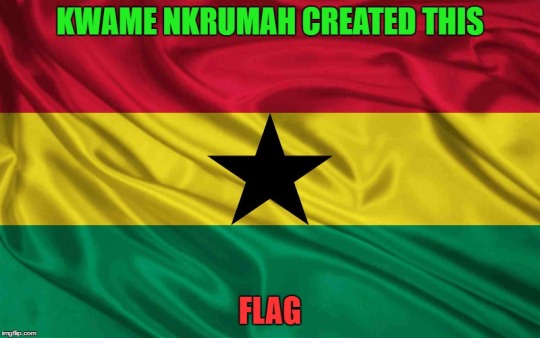
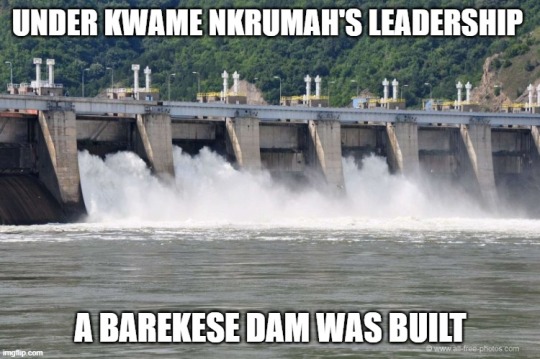

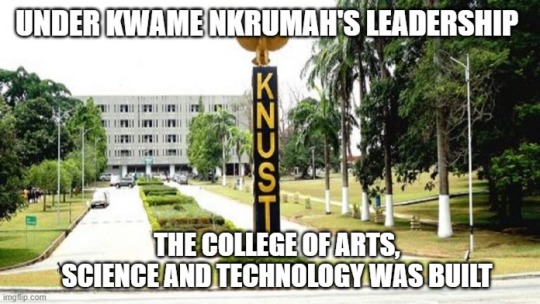
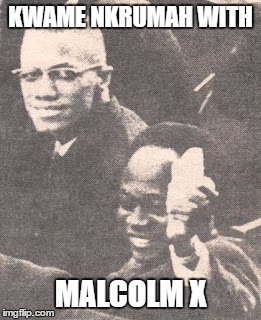
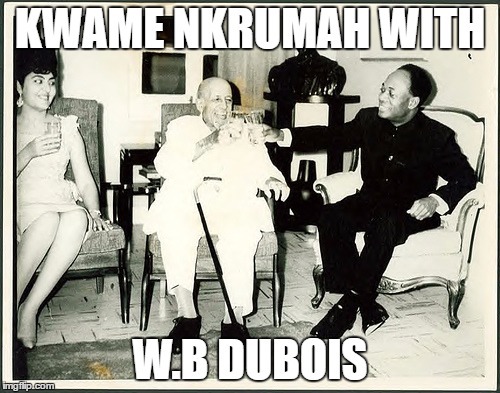
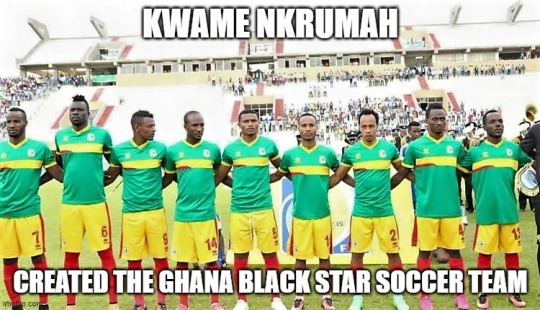

Nkrumaism is the highest stage of Black Power!
- In 1957, under Kwame Nkrumah's leadership Ghana produced 4,000 new teachers per year, prior to his leadership it was next to none, he also built 9 new hospitals, 2 new health centers, a medical school, 60 bridges, installed 4,800 new telephones, built 13 new post offices, 12 new teacher training colleges, 15,000 new housing room units, the Barekese Dam, dispensaries and primary school enrollment increase far beyond a half a million.
A man who went to a HBCU (Lincoln University), lived in the Hood, preached at black churches, created a futbol team (soccer team) called the Ghana Black Stars, became the first Black president of any country prior to Nelson Mandela and Barack Obama, designed a country flag inspired by the Garvey red, black and green flag and developed a shipping line influenced by Garvey's Black Star shipping line, became co-president of another country under Ahmed Se'kou Toure' in Guinea, prasied by both Dr. Martin Luther King Jr. and El Hajj Malik Shabazz (Malcolm X), was called a son by W.E.B. and Shirley DuBois, survived several assassination attempts by the CIA and was a writer of many books.
Oh I almost forgot to mention that he also expressed the term of having a United Socialist States of Africa that will liberate and give a physical freedom landbase for all Africans worldwide.
Nkrumah created his own philosophy based of principals of Marcus Garvey, Booker T. Washington, W.E.B. DuBois and Africa!
#Nkrumaism is the highest stage of #PanAfricanism & #BlackPower!#KwameNkrumah#industrialism#AfricanLiberation
#KwameNkrumah#nkrumaism#nkrumaismisthehigheststageofpanafricanism#panafricanism#nkrumaismisthehigheststageofblackpower#africaforafricans#blacklivesmatter#mlk#martinlutherkingjr#malcolmx#web dubois#marcusgarvey#bookertwashington#shirleygrahamdubois#muhammad ali#barekesedam#industrialism#development#technology#science#kwame nkrumah university of science and technology#kumasicollegeoftechnology#ghanayoungpioneers#blackstarssoccerteam#blackstars#blackstarshipping
764 notes
·
View notes
Text
How Socialism Destroyed Africa
How Socialism Destroyed Africa George B N Ayittey, PhD
(Presentation at the Heritage Foundation on March 11, 2019 in Washington DC).
A. Introduction
I would like to thank David Burton for the invitation to speak at the Heritage Foundation and I would also like to thank you for finding some time to come and listen to this lecture.
It may interest to know that exactly 30 years ago I was a Bradley Scholar here at the Heritage Foundation. I was on loan from Bloomsburg University, Bloomsburg, PA and was supposed to return after a year. I chose not to return. I am sure you would like to know why but let me just say that it was because the intellectual environment was extremely hostile. Even today, I still meet a hostile reaction when I say African leaders failed and betrayed their people.
One must always make a distinction between African leaders and the African people. The two are not synonymous. The leaders have been the problem, not the people. There have been exactly 309 African heads of state since independence in 1960. I will challenge anyone to name me just 20 good leaders out of the lot. Nobody has been able to do so, meaning that the vast majority – over 90% – were utter failures.
Africans are angry – angry at the condition of Africa. When Africans fought for independence, they expected to have freedom and development. But true freedom never came to much of Africa after independence. All we did was to trade one set of masters (white colonialists) for another set of masters (black neo-colonialists) and the oppression and exploitation of the African people continued unabated.
In 1990, only 4 African countries – Botswana, Gambia, Mauritius and Senegal – were democratic. In January 2017, only 17 out of 54 countries are democratic – Benin, Botswana, Cape Verde Islands, Gambia, Ghana, Kenya, Malawi, Mauritius, Mozambique, Namibia, Nigeria, Sao Tome & Principe, Senegal, Seychelles Islands, South Africa, Tanzania and Zambia. At this rate – 12 democracies in 27 years – it will take Africa exactly 94.5 years to become fully democratic, other things being equal.
Where is our freedom? The truth about postcolonial Africa is ugly, embarrassing and not politically correct, which is why some people in the West do not want to hear it. But we can’t sweep it under the rug.
“Free at last!” was the euphoric freedom chant that rang across Africa in the 1960s. Africa had won its independence from white colonial rule. New national flags were unfurled to the sounds of new national anthems. Leaders who fought gallantly and won independence were hailed as heroes and deified. Their pictures were hung in every government building. Currencies bore their portraits. Statues were erected for them. Then they settled down to develop Africa in its own image, not to satisfy the dictates of European metropolitan centers. But with what model? The challenge was daunting.
After independence, the first generation of African leaders launched a frontal assault on what they perceive to be Western institutions. Kwame Nkrumah of Ghana, for example, rejected democracy as an “imperialist dogma” while others dismissed it as “luxury Africa could not afford.” Capitalism was rejected as a Western colonial ideology in one monumental syllogistic error. Colonialism was evil and since the colonialists were capitalists, it too was evil. Socialism, the antithesis of capitalism, was adopted by nearly every African leader and was advocated as the only road to Africa's prosperity. Nkrumah surmised that "socialist transformation would eradicate completely the colonial structure of our economy" (Nkrumah 1973; p.189). Additionally, Nkrumah believed "Capitalism is too complicated for a newly independent state; hence, the need for a socialist society" (Nkrumah,1957; p.9).
A wave of socialist ideologies swept across the continent as almost all the new African leaders succumbed to the contagious ideology, copied from the East. The proliferation of socialist ideologies that emerged in Africa, ranged from the "Ujamaa" (familyhood or socialism in Swahili) of Julius Nyerere of Tanzania; the vague amalgam of Marxism, Christian socialism, humanitarianism and "Negritude" of Leopold Senghor of Senegal; humanism of Kenneth Kaunda of Zambia; scientific socialism of Marien N'Gouabi of Congo (Brazzaville); Arab Islamic socialism of Ghaddafi of Libya; "Nkrumaism" (consciencism) of Kwame Nkrumah of Ghana; and "Mobutuism" of Mobutu Sese Seko of Zaire. Only a few African countries such as Ivory Coast, Nigeria and Kenya were pragmatic enough to eschew doctrinaire socialism.
Kwame Nkrumah of Ghana, generally regarded as the "father of African socialism," was convinced that "only the socialist form of society can assure Ghana of a rapid rate of economic progress without destroying that social justice, that freedom and equality, which are a central feature of our traditional way of life" (Seven Year Development Plan. Accra: Government of Ghana, 1963; p.1).
Julius Nyerere of Tanzania, on the other hand, misread the communalism of African traditional society as readiness for socialism, which he was first exposed to during his schooling in Scotland. He castigated capitalism or the money economy, which in his view, "encourages individual acquisitiveness and economic competition." The money economy was, in his purview, foreign to Africa and it "can be catastrophic as regards the African family social unit." As an alternative to "the relentless pursuit of individual advancement", Nyerere insisted that Tanzania be transformed into a nation of small scale communalists ("Ujamaa") (Nyerere, 1962).
Accordingly, the Tanzania African National Union Constitution acknowledged as the first socialist principle "that all human beings are equal" and pledged that the government would give "equal opportunity to all men and women”, and would eradicate "all types of exploitation" so as to "prevent the accumulation of wealth which is inconsistent with the existence of a classless society" (Republic of Tanzania, 1967, p.1). Tanzania’s Second Five-Year Plan for Economic and Social Development laid emphasis on the fact that "considerable benefit will accrue in the long run from the expansion of public ownership because (a) it will be possible to create a genuine Tanzanian industrial know-how faster than under conditions of unrestricted private enterprise; (b) it will be possible to pursue a more effective industrial strategy than is possible under private enterprise; (c) the profits made in industry will be re-invested in United Republic of Tanzania". Thus, the Government as the representative of the people regarded ownership of the means of production by Tanzanians as an "antidote to capitalist exploitation" (Second Five-Year Development Plan 1964-69; p.iix).
B. The Socialist Transformation
Under Nkrumah, socialism as a domestic policy in his Seven-Year Development Plan was to be pursued toward "a complete ownership of the economy by the state." A bewildering array of legislative controls and regulations were imposed on imports, capital transfers, industry, minimum wages, the rights and powers of trade unions, prices, rents, and interest rates. Some of the controls were introduced by the colonialists but they were retained and expanded by Nkrumah. By 1970, nearly 6,000 prices, relating to more than 700 product groups, were controlled in Ghana (World Bank, 1989; p.114). Private businesses were taken over by the Nkrumah government and nationalized. Numerous state enterprises were established.
In 1967, Tanzania's ruling party’s Arusha Declaration established a socialist state where the workers and peasants controlled and owned the means of production. The Arusha Declaration sought to encourage self reliance primarily through an expansion of agricultural production for domestic consumption.
Banks, insurance companies, and foreign trading companies were nationalized. A "villagization" program was adopted to encourage the communal production, marketing, and distribution of farm crops. In 1973, Tanzania undertook massive resettlement programs under "Operation Dodoma", "Operation Sogeza", "Operation Kigoma" and many others. Peasants were loaded into trucks, often forcibly, and moved to new locations. Many lost their lives in the process and to prevent a return to their old habitats, abandoned buildings were destroyed by bulldozers. By 1976, some 13 million peasants had been forced into 8,000 cooperative villages and by the end of the 1970s, about 91 percent of the entire rural population had been moved into government villages (Zinsmeister, 1987). All crops were to be bought and distributed by the government. It was illegal for the peasants to sell their own produce.
Ethiopia adopted a similar program forced resettlements on government farms. In Mozambique, the Mozambican Liberation Front (FRELIMO) sought to establish a socialist state replete with collectivized agriculture, crop growing schemes and village political committees. According to Libby (1987):
The centerpiece of Frelimo's rural social program for Mozambique was the collectivization of agriculture into communal villages and cooperative farms. Agricultural cooperatives were intended to provide an integrated production base for the communal villages. Hence, villagization was designed to increase food and cash crop production and to make available common facilities for farming as well as provide social services such as education and health comparable with Ujamaa villages in Tanzania (p.216).
In the rest of Africa, planned socialist transformation of Africa meant the institution of a battery of legislative instruments and controls. All unoccupied land was appropriated by the government. Roadblocks, passbook systems were employed to control the movement of Africans. Marketing Boards and export regulations were tightened to fleece the cash crop producers. Price controls were imposed on peasant farmers and traders to render food cheap for the urban elites. Under Sekou Toure of Guinea's program of "Marxism in African Clothes,"
"Unauthorized trading became a crime. Police roadblocks were set up around the country to control internal trade. The state set up a monopoly on foreign trade and smuggling became punishable by death. Currency trafficking was punishable by 15 to 20 years in prison. Many farms were collectivized. Food prices were fixed at low levels. Private farmers were forced to deliver annual harvest quotas to `Local Revolutionary Powers.' State Companies monopolized industrial production" (The New York Times, Dec 28, 1987; p.28).
In Francophone Africa, industries were nationalized, tariff barriers erected and the state assumed near-total control of the national economy (Africa Analysis, Oct 2000). Rather interestingly, the World Bank, US AID, the State Department and even development experts from Harvard University supported these policies and channeled much aid resources to African governments (Bandow, 1986).
In Guinea, a state dominated socialist economy was set up beginning with independence in 1958, in Congo Brazzaville, a similar decision was taken in 1967, and in Benin, a socialist state was proclaimed in 1975. Even in avowedly capitalist countries like Ivory Coast, Kenya and Nigeria, the result became the same: government ownership of most enterprises, and a distrust of private-sector initiative and foreign investment, state controls as well as increasing state intervention in the economy.
In Nigeria, the state, in April 1971, acquired 40 percent of the largest commercial banks, and the Nigerian National Oil Company (NNOC) was established, with the government keeping a majority participation. Four years later the government acquired 55 percent of the petroleum industry and 40 percent of National Insurance Company of Nigeria (NICON). The following year the acquisition was extended to other insurance companies when the government took 49 percent of their shares.
Nigeria's Second Development Plan (1970 74) was unequivocal, declaring that: The interests of foreign private investors in the Nigerian economy cannot be expected to coincide at all times and in every respect with national aspirations. A truly independent nation cannot allow its objectives and priorities to be distorted or frustrated by the manipulation of powerful foreign investors. It is vital therefore for Government to acquire and control on behalf of the Nigerian society the greater proportion of the productive assets of the country. To this end, the Government will seek to acquire, by law if necessary, equity participation in a number of strategic industries that will be specified from time to time" (The Second National Development Plan, 1970 74: Program of Post War Reconstruction and Development, 1970, p.289).
C. The Results
Problems emerged soon after independence. State controls created artificial shortages and black markets. State-owned enterprises could not deliver, achieving very low rates of capacity utilization. Most of them were inefficiently run and unprofitable. At the time of the coup in Ghana in 1966, which overthrew Nkrumah, only 3 or 4 of the 64 state enterprises were paying their way (Garlick 1971; p.141). Consider the performance of these enterprises taken over by the state:
• In 1972, the government took over the African Timber and Plywood Company. Before the take over, "production was 75 percent of installed capacity but this has fallen to a woeful 13 percent" (West Africa Oct 12, 1981; p.2422).
• In 1976, the government of Ghana took over R. T. Briscoe, a foreign company. "Before the take over, the company was producing 241 buses in 1974. After the take over, production was 12 buses in 1977 and only 6 buses in 1978" (Daily Graphic, Jan 18, 1979; p.1).
In 1982, the Kenyan Government estimated the annual average rate of return on the $1.4 billion (1981 dollars) invested in SOEs since independence, in 1963, to be 0.2 percent——a return greatly less than what could have been obtained by depositing the sum in an interest-bearing account (World Bank, 2005).
In Tunisia, the government ran the airline, the steel mill, the phosphate mines, and 150 factories, employing a third of Tunisian workers. After 1990, the government sold off 35 companies and, Private businessman Afif Kilani bought one such company called Comfort, a featherbed for 1,200 workers who built 15,000 refrigerators a year. Mr. Kilani paid $3.3 million for the place in 1990. Five years later, he had whittled the workforce down to 600 workers who made 200,000 refrigerators a year. "Like all state companies, its point had been to support the maximum number of jobs”, he said. "It was social work. A sort of welfare”. (The Wall Street Journal June 22, 1995; p.A11).
In 1958, when Guinea gained its independence from France, it was considered to have the richest potential of Francophone Africa. It had one quarter of the world's bauxite as well as copious reserves of gold and diamonds. Prior to independence, Guinea was exporting food to neighboring French colonies, thanks largely to its fertile land. In addition, thousands of tons of bananas, pineapples, and coffee were shipped to Europe.
Proclaiming a doctrine of "Marxism in African clothes”, the first president, Ahmed Sekou Toure, set the country on a rigid course of state planning and controls. Recall that unauthorized trading became a crime. Private farmers were forced to deliver annual harvest quotas to "Local Revolutionary Powers”. Thousands of Guineans, who protested Toure's dictatorial rule, were imprisoned or executed. By 1984, at the time of Toure's death after 26 years of tyrannical rule, Guinea, once a food exporter, was spending a third of its foreign exchange earnings from bauxite on food. Further, saying “Nyet!” to Toure’s crass revolution, as many as two million Guineans fled to neighboring countries and Europe to live as voluntary exiles.
Study after study produced a damning indictment of SOE performance continent-wide. For example, in twelve West African countries, 62 percent of surveyed SOEs showed net losses, and 36 percent were in a state of negative net worth. By the end of the 1970s, cumulative SOE losses in Mali amounted to 6 percent of GDP. A 1980 study of eight Togolese SOEs revealed that losses in this group alone equaled 4 percent of GDP. In Benin, more than 60 percent of SOEs had net losses; more than three-fourths had debt/equity ratios greater than 5 to 1; close to half had negative net worth, and more than half had negative net working capital (World Bank, 2005).
In Tanzania, the agricultural economy was left devastated by state controls. Production of most crops showed a steady decline after 1974. Overall output of food crops rose only 2.1 percent between 1970 and 1982, well below the population growth of 3.5 percent. By 1981, a food crisis had gripped the nation, turning it into a net importer of basic foodstuffs. The country had to import one million tons of grain to avert population starvation. The towns and cities had to be supplied with imports of grain costing as estimated 2,000 million shillings (Libby 1987; p.254). In 1971/72, grain imports were 135,000 tons, including 90,000 tons of maize. In 1972—73, grain imports dropped to 90,000 tons, of which 80,000 tons were maize. However, during the next year from August 1973 to July 1974, Tanzania was forced to import over 500,000 tons of maize alone (African Business 1979; p.21). For eight years (1974-1982), Tanzania’s income per capita had remained stagnant at $210 (World Bank 2000; p.35). Exports of agricultural produce were similarly affected Exports of cotton have fallen to pre independent volumes and sisal output is less than a third of its 1961 total. In the last ten years, the annual cashew exports fell from 140,000 to 30,000 tons. The total tonnage of all export crops was 20 percent less in 1984 than it had been in 1970. Production of basic food crops, such as maize, rice and wheat, have also declined to half their 1972 levels. And, as could be expected, food imports have doubled" (Zinsmeister, 1987; p.33).
In Zimbabwe, the devastation was almost total. Upon independence in 1980, President Robert Mugabe openly stated his determination to make Zimbabwe a one party nation and his Zimbabwe African National Union (ZANU) party "a truly Marxist Leninist party to ensure the charting of an irreversible social course and create a socialist ideology”. Indeed, in December 1982 all 57 ministers and deputy ministers in Mugabe's cabinet arrived at the Harare airport to greet visiting Ethiopian leader Mengistu Haile Mariam—black Africa's arch-apostle of Marxism-Leninism. Inheriting an economy that was hobbled by racial inequalities under the former white-minority regime, there was a strong need for statism, to correct injustices committed by white colonialists.
The country was the bread basket of the region. But state controls, state regulations and forcible seizures of white commercial farmlands without compensation destroyed agriculture and turned the country into a net food importer.
The economy declined progressively. Corn production dropped sharply from 2 million tons in 1981 to 620,000 in 1983. Shortages of commodities and foreign exchange were rampant. The cost of living rose astronomically. By 2008, things had gotten progressively worse. Inflation was raging at 2 million% and unemployment was at 80%. In 2009, the currency collapsed and the US dollar was adopted. About 4 million fled to neighboring countries. In October 2017, Mugabe was driven out of office and was succeeded by Emmerson Mnangagwa, his former security chief.
D. Reasons for Failure
1. Exploitation and Oppression
Many governments not only nationalized European companies, ostensibly to prevent "foreign exploitation", but also vented their rage against the natives. In many other countries, the natives were squeezed out of industry, trade, and commerce, and the state emerged as the domineering, if not the only, player. Indigenous operators were not tolerated. Indeed, there was a time when the director of the Club du Sahel, Anne de Lattre, would begin her meetings with the frightening remark, "Well, there is one thing we all agree on: that private traders should be shot" (West Africa, Jan 26, 1987; p.154).
Unbelievable brutalities were heaped upon peasant farmers and traders under Ghana inane price controls (1982-1983). Ghanaian cocoa farmers in 1983 were paid less than 10 percent of the world market price for their produce. In Gambia, peanut producers received about 20 percent for their produce in the same year. According to West Africa (Feb 15, 1989):
“On the average, between 1964/65 and 1984/85, the peasants of Gambia were robbed of 60 percent of the international price of their groundnuts! For 20 years, the Jawara Government `officially' took, free of charge, 3 out of every 5 bags, leaving the peasant with a gross of 2. With deductions for subsistence credit fertilizer, seeds, etc., the peasant would end up with a net one bag out of five . . . With these facts, it is simply wrong to say that the poverty of the peasant derives from the defects of nature drought, over population, laziness, and so on (p.250).
In 1981, the Government of Tanzania paid peasant maize farmers only 20 percent of the free market price for their produce. "Studies by the International Labor Organization have indicated that taxation levels in the agricultural sector in Sierra Leone averaged between 30 and 60 percent of gross income" (West Africa, 15 Feb 1982; p. 446).
In Zambia, when traders refused to sell their produce at government dictated prices, authorities raided markets in May 1988. They arrested hundreds of people, took their money, and tore down market stalls, seizing sugar, detergents, salt, maize meal, soft drinks, candles, flour, and clothing. Back in 1984 in Ghana, “some unidentified soldiers who made brief stopovers at Swedru to check prices, robbed innocent traders” (West Africa, July 23, 1984; p.1511).
In this way, the peasantry was systematically robbed of considerable resources. For example, in a January 1989 New Year's address, President Houphouet-Boigny of Ivory Coast admitted that, over the years, peasant cash crop producers "have over the years parted with four-fifths of the value of what they produced to enable the government to finance development" (West Africa, May 1-7, 1989; p.677). But development for whom? About 70% of Ivory Coast’s development was concentrated around Abidjan, capital, for the elite -- not the farmers.
Eventually, the peasantry rebelled. Farmers decided that they would no longer produce surpluses for the state to expropriate. Beginning in the 1980s, production of food and cash crops began to decline across Africa.
2. Administrative Ineptitude
State owned enterprises were acquired haphazardly with little planning, resulting in grotesque blunders and mismanagement. There is extensive evidence for these, but suffice it here to give a few dramatic examples. • In Ghana, two tomato canneries were built in different parts of the country. The capacity of either one of them would have met the total domestic demand (Killick 1978; p.229).
• It took six years to complete Ghana's state footwear corporation factory and by the time it was ready to go into production much of its equipment was obsolete (Killick 1978; p.231).
• The Ghana government owned sugar factory at Komenda, after completion, stood idle for more than a year because it lacked a water supply system (Killick 1978; p.231).
• In Uganda and Angola, some high rises lacked glass panes and running water. In Mali, a Soviet built cement factory at Diamou was designed for a capacity of 50,000 tons a year. Beset by regular breakdowns, it produced only 5 tons in 1983 (Time, Jan 16, 1984; p.27).
• Ghana's State Meat Factory at Bolgatanga, which produces the VOLTA corned beef, was closed for 9 months. Yet, employees received full pay (West Africa, Nov 30 1981; p.2884).
• A Yugoslav company built a mango processing plant in Ghana with a capacity exceeding the entire world's trade in canned mangoes. When the factory was commissioned in 1964, it was discovered that the supply of mangoes came from a few trees scattered in the bush (Killick 1978; p.229).
Western governments and development agencies failed to exercise prudence in granting aid and loans to African governments. Much Western aid to Africa was used to finance grandiose projects of little economic value and to underwrite economically ruinous policies. There are many horrifying blunders. In the 1980s, Canada funded a fully-automated modern bakery in Tanzania but there was no flour to bake bread. In Somalia, the Italian funded a banana-boxing plant but the production capacity needed to make the plant break even exceeded the country’s entire output of bananas. And in northern Kenya, Norwegian aid officials built fish-freezing plant to help the Turkana people in 1971 at a cost $21 million. The only problem was the Turkana people do not fish; they raise goats (The Associated Press, Dec 23, 2007). According to The Wall Street Journal (July 29, 1985): The U.S. built 50 crop storage depots in 1983 in Senegal and placed them in locations the peasants never visited. In Uganda, a railroad expert discovered to his amazement that a repair shop built with foreign aid was seven times as large as the one he ran in Germany. A fifth of Ivory Coast's foreign borrowing went to build two sugar mills that started production just four years ago and now are closed. In Sudan, the Soviets built a milk bottling plant at Babanusa. Babanusa's Baggara tribesmen drink their milk straight from the cow and there aren't any facilities to ship milk out of Babanusa. The 20 year old plant hasn't produced a single bottle of milk. (p.18)
But the mother of all state-owned enterprises can be found in Nigeria – the Ajaokuta Steel Mill. In 1975, Nigeria purchased a Russian made steel-making furnace. But it was built on a site so remote from iron and coal mines as to render it useless. Subsequently, Russian, German and French technicians spent billions of naira to make it operational. They did not work. Known as the Ajaokuta steel mill, the government made fruitless efforts over the decades to resurrect it. By 2017, “The Ajaokuta steel that had reached 98 per cent completion as far back as 1994 had not produced a single steel till date . . . The federal government had spent over $10 billion over 34 years and would require another $2 billion to complete the remaining two per cent of the plant” (Premium Times, Dec 26, 2017).
By 2019, it had attracted $8 billion in additional government subsidies without producing a single beam of steel. Yet, over 100,000 workers were on the payroll drawing pension (The Economist, Feb 8, 2019).
3. Venal Tendencies/Corruption
State controls created artificial shortages, providing rich opportunities for rent-seeking activities and illicit enrichment. Import and exchange controls were the most lucrative. Ministers demanded 10 percent commission before issuing an import license. Everyone was chasing scarce commodities to buy at government-controlled prices and resell on the black market to make a profit – a process known in Ghana as “kalabule.”
More perniciously, the ruling elites discovered that they could not only use state controls to enrich themselves but also to punish the political rivals. For example, they would deny import license to import newsprint to newspapers that were critical of them.
More annoying was the out and out betrayal and theft by many of the first generation of leaders. “Only socialism will save Africa!” they chanted in the 1960s. But the socialism they practiced was a peculiar type of “Swiss-bank socialism,” which allowed the head of state and a cohort of ministers to rape and plunder state treasuries for private accounts in Swiss and other foreign banks. Askeed to define socialism, a Zimbabwean official said, “Here in Zimbabwe, socialism means what’s mine is mine, but what’s yours we share!”
Indeed, in Zimbabwe, $15 billion of revenue from the Marange diamond fields was plundered by the ruling elite in 2015 (New Zimbabwe, March 5, 2015). In Mozambique, $2 billion in loan proceeds simply vanished in 2018. Ndambi Guebuza, “he oldest son of former president Armando Guebuza was arrested on that debt scandal” (Daily Nation, Jan 17, 2019). A 2011 report commissioned by the United Nations Development Fund “said that between 1990 and 2008, $34 billion disappeared from Angola’s public coffers” (The Wall Street Journal, Oct 15-16, 2011; p.A10). Isabel dos Santos, the daughter of former president, Eduardo, who ruled for 38 years, is the richest woman in Africa with a net worth of $2.2 billion (Forbes, March 8, 2019). Her father, Jose Eduardo, was worth $20 billion (The Citizen, Oct 4, 2017). Meanwhile, some 65% of Angolans remain poor and lack access to clean water, electricity and sanitation.
If you want to understand why America is rich in Africa is poor, ask yourself this question: H ow do the rich in both places make their wealth? Here in America, the richest person is Jeff Bezos of Amazon.com. He created it and has something to show for it. In fact, 80% of US billionaires are problem-solvers. Now let’s go to Africa. Who are the richest? The richest in Africa heads of state and ministers. Quite often, the chief bandit is the head of state himself. How did they make their money? By raking it off the backs of their suffering people. What did they create? Nothing. In fact, none of Africa’s billionaire presidents made their wealth in the private sector. So, how do they teach the youth about wealth creation?
Here is a list of Africa’s billionaire presidents:
NAME LOOT
Mobutu Sese Seko $1 - $5 billion (Forbes, Nov 8, 2011) (Zaire, now Congo DR)
Charles Taylor (Liberia) $5 billion (BBC News, May 2, 2008 http://news.bbc.co.uk/2/hi/africa/7379536.stm)
The late Gen Sani Abacha (Nigeria) $5 billion (Sunday Times, Dec 17, 2000. and $1 - $5 billion (Forbes, Nov 8, 2011)
Omar al-Bashir (Sudan) $9 Billion (BBC News Africa, Dec 18, 2010)
Gen Ibrahim Babangida (Nigeria) $12 billion (Forbes, Nov 8, 2011)
Ben Ali (Tunisia) $13 billion (The Wall Street Journal, June 20, 2011)
Hosni Mubarak (Egypt) $40 billion (The Sun, Jan 11, 2011)
Muammar Khaddafi (Libya)i $200 billion (Los Angeles Times. Oct 21, 2011: http://articles.latimes.com/2011/oct/21/world/la-fg-kadafi-money-20111022\
“Every military regime is a fraud. Anybody who heads a military regime subverts the wishes of the people” – said General I.B. Babangida (rtd), former head of state of Nigeria (The African Observer, Jan 18-31, 1999; p.6). He should know; he stole $12 billion.
The Atlantic Monthly (May 20, 2010) provided an analysis of the net worth of all 43 U.S. presidents – from Washington to Obama – and found the combined net worth to be $2.7 billion in 2010 dollars. Evidently, Abacha, Babangida, Bashir, Houphouet-Boigny, and Mobutu each [stole more than the net worth of all U.S. presidents combined!
4. Alien ideology
Socialism can never be justified upon the basis of African tradition. The basic economic and social unit in the West is the individual. The American says “I am because I am and I can do anything I want at any time.” The emphasis is on the “I,“ the individual. In Africa, a person says ”I am because we are.” The “we” connotes the extended family, group or community. Land, for example, is owned by the extended family, so the African would say that “the land belongs to us.” The early Europeans misinterpreted that to mean land belonging to every Tom Dick and Harry in the village, which gave rise to the myth of communal ownership. The extended family pools is resources together and may share them among its members but the extended family is a private entity, not the tribal government. Many of the leaders and scholars mistook these aspects of African cultural heritage – helping one another, community awareness, sharing of resources, and so on – as a justification for African socialism. They were wrong.
In traditional Africa, one does not have to line up before a chief‘s palace to seek permission to engage in trade or some occupation. There were free markets, free enterprise and free-trade in Africa before the colonialists arrived. Perhaps, this was the most singular reason why socialism failed miserably in Africa because it is an alien ideology.
E. Aftermath
Nkrumah was overthrown in a military coup in 1966. But his statist experiment did not end then. Successive Ghanaian governments retained, and in some cases expanded, the state interventionist behemoth Nkrumah had erected. Foreign mining companies were subsequently nationalized. More state enterprises were set up and a denser maze of controls were placed on prices, rents, interest, foreign exchange exports, and imports. “The Ghana government owns nearly 90 percent of the companies doing business in the country. There are nearly 340 plus state-owned enterprises. Out of this number, only 17 have posted improved figures to date” (Ghana Drum Oct 1992; p.17).
The socialist ideology has left two pernicious legacies that will hold Africa back for some time to come. The first is socialist mentality – the tendency to look up to the government or the belief that government must solve every problem. This can be discerned from the following instances:
• Ask them to trim their bloated bureaucracies and cut government spending and they will establish a “Ministry of Less Government Spending” (Mali). • Ask them to establish a market-based economy and place more emphasis on the private sector and they will create a “Ministry of Private Enterprise,” as Ghana did in 2002. • Ask them to establish good governance and they will set up a “Ministry of Good Governance” (Tanzania). Don’t ask them to improve transparency!
Second, the state machinery and infrastructure that were erected in the 1960s to give effect to socialism were not dismantled. This has led to a phenomenal growth in the public sector that is now packed with cronies, relatives and party hacks in a multiplicity of parallel institutions and ministries with overlapping functions. Ghana, for example, has Ministry of Aviation, Ministry of Roads and Highways, Ministry of Transport, Ministry of Roads and Transport, Ministry of Ports and Railways. Why not just one Ministry of Transportation?
Bloated bureaucracies are riddled with willful dissipation of public funds, financial irregularities and profligacy. Ghost workers abound:
• In Ghana, there were over 6,000 ghost workers on government payrolls and their salaries collected by living workers in Ghana (Ghana Web, Dec 13, 2014). • In Nigeria, 62,893 ghost workers were nabbed and hopefully reburied (African Leadership, Feb 18, 2015). • Of the 1.2 million civil servants in Congo DR, an astonishing 500,000 were found to be ghost workers (Der Spiegel, June 5, 2017).
In 2009, Kenya had 94 ministers and deputy ministers; Zimbabwe had 82. Angola checked in with 88. Ghana, with a population of 25 million, had 97 cabinet and regional ministers plus their deputies in 2009. By 2017, the number had grown to 110 -- the largest in Africa.
In addition, there are ministers of state at the presidency, presidential staffers and advisors. At each ministry, there are a principal secretaries, deputy principal secretaries, assistant deputy principal secretaries, etc. The next batch comprise governors or regional ministers and their deputies. Then there is the legislature – Senators and MPs, all feeding off the government trough.
Then each Minister must have a government bungalow (house), a Pajero (SUV), a saloon car for Madam, a garden boy, a cook, a day watchman, a night watchman and a security guard to accompany the official. Then each senior government officer is entitled to a house loan, furniture loan, fridge loan and even an education loan for the children. These perks were offered by the colonial masters to their subjects to entice them to serve in the colonies, but hardly made sense to retain them after independence. Nigerian legislators are highest paid in the world. Its Senators enjoy an obscene smorgasbord of perks and allowances that take their salaries to a cool $2 million each when 60% of the population earn less than $2 a day. An outrageous perk is "hardship" allowance.
The huge government workforce consumes 70 percent of Ghana’s budget; 80% in Zimbabwe. This means that the government has little savings left for capital expenditures for development.
South Africa
Strange as it might sound, the ruling elites in South Africa are poised to repeat the catastrophic mistakes we made in sub-Saharan Africa. Some senior members of the ruling ANC seek constitutional amendment to seize white-owned land without compensation and a breakaway faction, the Economic Freedom Fighters (EFF) seek to nationalize the central bank and all new discoveries of oil and gas – all this in the teeth of the disastrous socialist experiment right next door in Zimbabwe.
It needs to be emphasized that one of the cruelest jokes perpetrated on a gullible world was the misconception that the South African economy under apartheid was a "capitalist and free market”.
Under apartheid, the South African economy was characterized by severe state interventionism: where blacks could live and work, and what type of jobs they could take, were all determined by the state. The fictional link of apartheid to capitalism remained well into the 1990s, even though the National Party government operated a horrendous array of programs to maintain a heavy presence in the economy.
Apartheid must be repudiated but it was not capitalism. Colonialism needed to be repudiated but it was not capitalism. Albert Einstein once defined insanity as doing the same thing again and again and expecting different results. Lunacy may be defined as doing the same stupid thing again and again and expecting the same stupid results.
Thank you.
REFERENCES
Government Publications
Seven Year Development Plan, 1963 -1970. Accra: Government of Ghana, 1963.
"African Socialism and its Application to Planning in Kenya”. Sessional Paper No. 10. Nairobi: Republic of Kenya, 1965.
Tanzania’s Second Five-Year Plan for Economic and Social Development. Dar-es-Salaam: Republic of Tanzania, 1967.
The Five-Year Development Plan, 1990-1995. Harare, Zimbabwe. Government Printer.
Other Sources
Ayittey, George B.N. Africa Betrayed. New York: St. Martin’s Press, 1992.
___________ (2005) Africa Unchained. New York, NY: Palgrave/McMillan.
___________ (2018) Applied Economics for Africa. Washington, DC: Atlas Network.
Bandow, Doug (1986). "The First World's Misbegotten Economic Legacy to the Third World", Journal of Economic Growth, Vol. l, No.4: l7.
Garlick, Peter (1971). African Traders and Economic Development. Oxford: Clarendon.
Killick, Tony (1978). Development Economics In Action: A Study of Economic Policies in Ghana. London: Heinemann.
Libby, Ronald T. (1987). The Politics of Economic Power in Southern Africa. Princeton: Princeton University Press.
Manning, Patrick (1988). Francophone Sub Saharan Africa l880 1985. New York: Cambridge University Press.
Nkrumah, Kwame (1957). Ghana; An Autobiography. London: Nelson.
_____ _________ (1973). Revolutionary Path. New York: International Publishers.
Nyerere, Julius K. (1962). Ujamaa: The Basis Of African Socialism. Dar es Salaam: Government Printer.
World Bank (1989). Sub-Saharan Africa: From Crisis to Self-Sustainable Growth. Washington, D.C.: World Bank.
___________ (2000). Can Africa Claim the 21st Century? Washington, DC: World Bank publication.
World Bank, 2005. The Evolution of Enterprise Reform in Africa: From State-Owned Enterprises to Private Participation in Infrastructure—and Back. Technical Paper Series; No.84. Washington, DC.
Zinsmeister, Karl (1987). "East African Experiment: Kenyan Prosperity and Tanzanian Decline," Journal of Economic Growth, Vol.2. No.2:28.
1 note
·
View note
Text
Nkrumaism

Nkrumaism (sometimes Consciencism) is an African socialist political ideology based on the thinking and writing of Kwame Nkrumah. Nkrumah, a pan-Africanist and Marxist–Leninist served as Prime Minister of the Gold Coast (later Ghana) from 1952 until 1960 and subsequently as President of Ghana before being deposed by the National Liberation Council in 1966.
Definition
View On WordPress
0 notes
Text
Adventist Minister To contest For CPP Flagbearer
Adventist Minister To contest For CPP Flagbearer
The Reverend Dr. Divine Ayivor, Adventist Ministeris set to contest for the Flagbearer slot of the Convention People’s Party (CPP) slated for March 8 at Kumasi in the Ashanti Region.
Dr Ayivor who is the Pastor of Prince Emmanuel SDA Church Ringway is a nephew of Mr Komla Agbeli Gbedema, with a strong root in the traditions of Nkrumaism.
A Special Assistant to the Dr Ayivor told the Ghana News…
View On WordPress
0 notes
Text







At this point I am literally begging Black African Melinated people all over the world to embrace Nkrumaism as our solution to destroy white supremacy, racism, colonialism, neo-colonialism, capitalism, police brutality and imperialism. This ideology is the answer because it scientifically lay out the solutions that Black people need to put to action such as:
1. Reclaiming our land of Africa
2. Understanding that the process of class struggle will get us closer to freedom quicker
3. Realizing that the mases of working class Black people all over the world need to join a revolutionary Pan-African Socialist organization
4. Accepting scientific socialism as the only just economic system that erodes class oppression, eliminates exploitation of our labor and promotes true equality for all
5. Humanism - treating other human beings how you want to be treated
6. Egalitarianism- Every person having an equal playing field to develop to their highest potential
7. Collectivism- Doing what is best for our people & the community and not only for the individual
8. Having a true "African Personality" that produces a revolutionary culture which progresses our people forward
9. Pan-Africanism- Having a United Africa of Socialist states that destroys invisible borders
10. Promoting industrialism under a African focus of controlling our destiny through the means of raw minerals, land, farms, factories, animals etc.
I am begging all "woke" Africans of the diaspora and on the continent of Africa to adopt this approach in 2020 and beyond.
Forward ever!!
#africa#black women#blacklivesmatter#black panther#freedom#malcolmx#kwame nkrumah#nkrumaism#south africa#afrocentric#african#african culture#afrika#african american#afrocuban#afroculture#afrobrazilian#afrofuturism#afro#afropunk#afroart#afropic#afro witch#afroamerican#black#brooklyn#black gold#black friday#blackout
191 notes
·
View notes
Photo
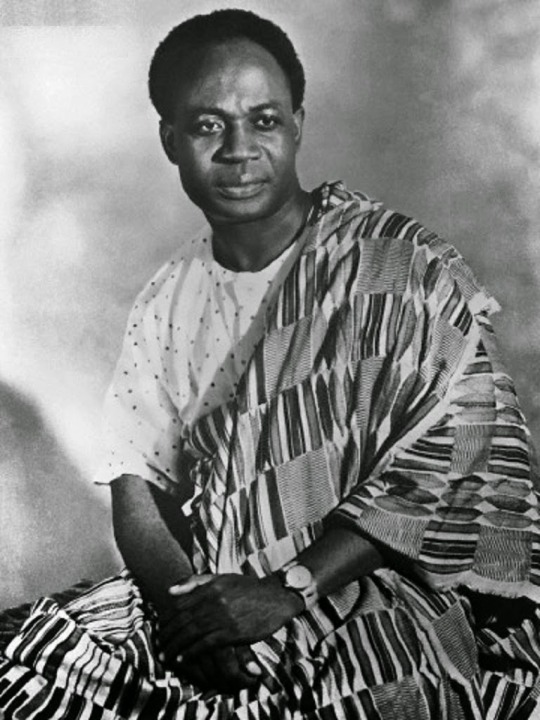
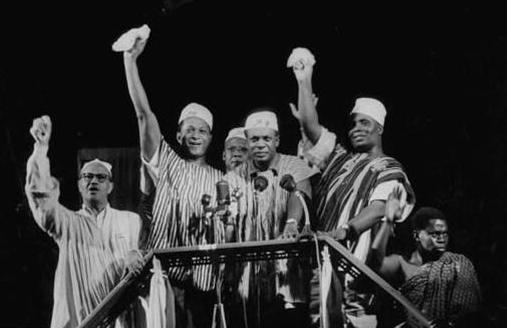
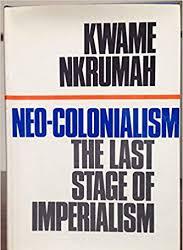



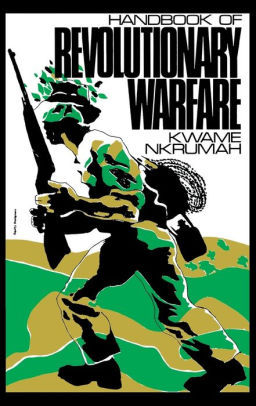
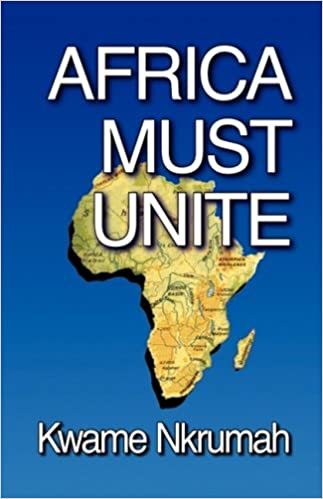


Nkrumaism is the highest stage of Black Power and Pan-Africanism because it unites all African people by teaching us the commonality of our history, culture, current realities and best future prospects; gives us a philosophy, a worldview, that takes into account our history and culture. Nkrumaism also show us how to achieve, tactically, a united socialist motherland and teaches how to extract the positive from our 3 experiences of Islam, Euro-Christianity and traditional Africa ---- and unite the positives to create a new African reality, a new Africa free from exploitation. Nkrumaism teaches us to embrace the principles of humanism, Afrofuturism, collectivism and egalitarianism in order to sustain and nurture ourselves until and after we are truly liberated.
Every Black, African, Melanated person who wants liberation for poor people and African people should study the philosophy of Nkrumaism.
#nkrumaism#kwamenkrumah#Nkrumaismisthehigheststageofblackpower#nkrumaismisthehigheststageofpanafricanism#blacklivesmatter#africanlivesmatter#nkrumaismorperish#panafricanism#blackpower#read#afrofuturism#humanism#collectivism#egalitarianism#africa#africaforafricans
114 notes
·
View notes
Photo

It’s Not the Man (i.e. the Police); it’s the Plan (i.e. Capitalism)!
Let it not be lost on you that the African woman is the most oppressed person on the face of the earth. To put this reality into context using the popular maxim “when white America catches a cold, Black folks get pneumonia”. We maintain, for the African woman, she is under intensive care with full respiratory failure. Witness the brutal assassination of Breonna Taylor at the hands of the police.
The Crisis in the African World
Against the backdrop of global white supremacy, born out of capitalism, The World Health Organization has declared our homeland, Africa, as the world’s most dramatic public health crisis. Whether we are looking at Africa’s inadequate healthcare system, which is a byproduct of the neocolonialists’ and their African puppets’ siphoning of resources from the continent, the disproportionate impact of the coronavirus on African people (again born out of generational inequality-capitalism) and state violence at the hands of police officers (modern day policing finds its genesis in slave capture and control), we understand that the African is catching hell all over the world.
The despicable, yet heart wrenching, video capture of the murder of George Floyd, at the hands of the Minneapolis Police Department, only serves to highlight the insulated brashness with which this capitalist apparatus operates within the u.s. While the world has taken notice, and we are witnessing worldwide protests, it is imperative that we use a historical materialist analysis of the condition of the African worldwide (Nkrumaism) to inform our next steps. As sure as the earth orbits the sun, this will not be the last case of police murder against an African person this year, this month, or even this week. A 2019 analysis by a u.s. advocacy group, Mapping Police Violence, discovered that 99 percent of police killings between 2014-2019 did not result in an officer being charged, and certainly not convicted. We stand in solidarity with all those fighting against police violence. We scream vehemently “POWER TO THE PEOPLE!!” We also understand that this moment obliges us to intensify the struggle by studying strategies and tactics developed in Pan-African organizations (political education).
The Enemy
But why are African people and people of African descent catching hell all over the world? We believe it's not the man (i.e. the police); it's the plan (i.e. capitalism). Capitalism is an economic system in which the means of production (for example, the mineral resources, the industries, the equipment, the technology, the medicines) are owned and controlled by a few people, the capitalist class, who live off of the labor of the workers for the maximization of capitalist profit. This is pure exploitation which leads to oppression. Capitalism, therefore, is the primary enemy of all African, poor and working class people.
While it exploits and oppresses all of us who are not of the owning, ruling class, it exploits and oppresses people of color, especially African people even more because this unfair economic system gives birth to, breeds, national oppression (racism) and gender oppression (sexism). And because some form of capitalism has been around for hundreds of years (whether slavery, colonialism, settler-colonialism, neo-colonialism), racism and sexism have been ingrained within the capitalist system. They have become institutionalized. The capitalist justice system is an institution and thus racism is an integral part of it. The police force, as an integral part of the capitalist justice system, will breed racist cops--generation after generation until capitalism in all of its forms is destroyed. That is why we say it's not the man (the police), but the plan (the economic system of capitalism) that is our primary enemy.
The Solution
Only the destruction of capitalism and the establishment of socialism will rid us of racist police. And to destroy capitalism and to establish socialism we as African people must educate, mobilize and organize ourselves. We must educate ourselves about our enemy, about our history, culture and current reality. We must mobilize ourselves to demand immediate change. Most importantly we must organize ourselves for permanent change. For African people, the quickest solution for eradicating our exploitation and oppression is to establish not only socialism, but socialism within our own unified land base of Africa: Pan-Africanism. With its immense wealth, a unified, socialist Africa will more quickly empower African people and those of African descent to demand justice wherever they happen to be born or to live in the world. Join a revolutionary Pan-African socialist organization today!
Forward ever to African People everywhere! Forward to Pan-Africanism! Forward to Socialism! Forward to the Exploited and Oppressed Peoples all over the World!
For more information on the Pan-African Revolutionary Socialist Party (PRSP):
www.prsponline.org
Africa Must Unite [email protected]
#prsp#panafricanrevolutionarysocialistparty#panafricanismorperish#nkrumaism#africa#ghana#senegal#mali#burkina faso#zimbabwe#togo#southafrica#haiti#brazil#minnesota#baltimore#harlem#george floyd#breonnataylor#socialism#capitalism#anti capitalism#neocolonialism#colonialism#slavery#policekillings#imperialism#spreadtheword
23 notes
·
View notes
Video
youtube
Nkrumaism is the highest stage of Black Power and Pan-Africanism!
19 notes
·
View notes
Photo
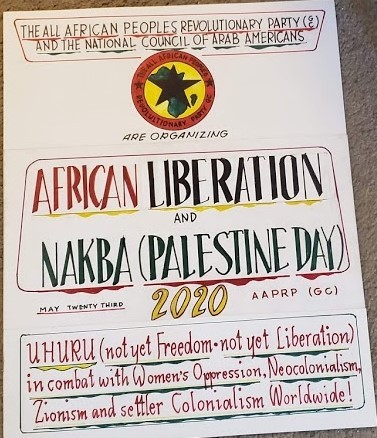
If you are proud to be African, please click & share this link: http://www.a-aprp-gc.org/
#africanliberationday#Palestineday#palestine#africa#uhuru#freedom#Zionism#Womensoppression#neocolonialism#imperialism#capitalism#panafricanism#nkrumaism#aaprpgc#aaprp#scientificsocialism#africanliberation
12 notes
·
View notes
Photo




Reforms = Oppression Another African dead in a mine field = Another capitalist more richer Another Black man killed = Another White men free
Nkrumaism is the only answer to end our oppression and it is also the highest stage of Black Power and Pan-Africanism because it unites all African people by teaching us the commonality of our history, culture, current realities and best future prospects; gives us a philosophy, a worldview, that takes into account our history and culture. Nkrumaism show us how to achieve, tactically, a united socialist motherland and teaches how to extract the positive from our 3 experiences of Islam, Euro-Christianity and traditional Africa ---- and unite the positives to create a new African reality, a new Africa free from exploitation. Nkrumaism teaches us to embrace the principles of humanism, Afrofuturism, collectivism and egalitarianism in order to sustain and nurture ourselves until and after we are truly liberated.
Every Black, African, Melanated person who wants liberation for poor people and African people should study the philosophy of Nkrumaism.
LETS END OUR OPPRESSION ONCE AND FOR ALL!
REFORMS = BLOODSHED REVOLUTION = BLOODSHED
NKRUMAISM IS THE HIGHEST STAGE OF BLACK POWER & PAN-AFRICANISM!!!
#AHMAUDARBERY #DREASJONREED #MCHALEROSE
#ahmaudarbery#dreasjon reed#MCHALEROSE#NKRUMAISM#blacklivesmatter#fight#blacktumblr#makeitviral#read#study#struggle#covid-19#blackpower#panafricanism#coronavirus#quarentinelife#BLACKQUARATINELIFE#kwame nkrumah#africa#africaforafricans#weneedland
8 notes
·
View notes
Text
Proletariat15 speaks on current conditions of African peoples
#africa#black women#black panther#blacklivesmatter#freedom#kwame nkrumah#malcolmx#nkrumaism#georgefloyd#police brutality#politics#socialism#south africa#scientificsocialism#african culture#african#afrika#racism in america#racism#police#blackpower#blackpeople#baltimore#ghana#harlem#philadelphia#atlanta#blacklove#working class#class struggle
4 notes
·
View notes
Video
youtube
Happy African Liberation Day Weekend, Month & Year!!!
#Nkrumaism is the highest stage of Pan-Africanism & Black Power!
#KwameNkrumah
#AfricanLiberationDay
5 notes
·
View notes